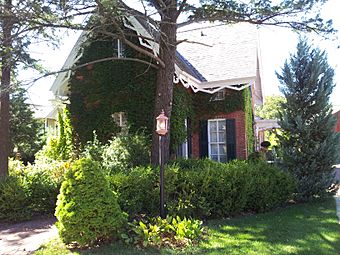Gen. James Bintliff House facts for kids
Quick facts for kids |
|
|
Gen. James Bintliff House
|
|
 |
|
| Location | 723 18th Ave. Monroe, Wisconsin |
|---|---|
| Area | 0.33 acres (0.13 ha) |
| Built | 1858 |
| Architectural style | Gothic Revival |
| NRHP reference No. | 79000080 |
| Added to NRHP | May 14, 1979 |
The Gen. James Bintliff House is a historic home built in 1858 in Monroe, Wisconsin. It was added to the National Register of Historic Places in 1979. This means it's a special place recognized for its important history.
Contents
Who Was General James Bintliff?
James Bintliff was born in England and moved to America around 1841. He first worked in wool factories in New York. Later, in 1853, he moved to Monroe, Wisconsin.
Bintliff's Early Career
In Monroe, James Bintliff had many different jobs. He worked as a bookkeeper in a store that sold fabrics and other goods. He was also a bank cashier and even the local register of deeds, which means he kept official records. In 1859, he started working as a lawyer. The next year, in 1860, he and a friend bought a local newspaper called the Monroe Sentinel.
Bintliff's Role in Politics and War
James Bintliff was very involved in politics. He helped start the Republican Party in his area. He was also strongly against slavery.
When the American Civil War began, Bintliff became a soldier. In 1862, he put together a group of infantry soldiers. This group was captured during the Battle of Thompson's Station in Tennessee.
After being released, Bintliff continued to serve. He helped recruit the 38th Wisconsin Volunteer Infantry Regiment. He also commanded three different regiments during the Third Battle of Petersburg. This was an important battle in the war.
Becoming a General
Because of his excellent service in the war, James Bintliff was recognized. In 1866, President Andrew Johnson nominated him for a special military rank. The U.S. Senate confirmed this nomination. Bintliff was appointed to the rank of brevet brigadier general of volunteers. A "brevet" rank is an honorary promotion given for brave or distinguished service, without a change in pay or command.
The Bintliff House: A Gothic Revival Gem
James Bintliff's house in Monroe was built in 1858. It is a great example of Gothic Revival style. This style was popular in the mid-1800s and looks a bit like old castles or churches.
Unique Features of the House
The Bintliff House has several features that show its Gothic Revival style:
- It has a very steep roof.
- The windows are tall and narrow.
- The gables (the triangular parts of the wall under the roof) have fancy, carved wooden decorations called bargeboards.
The house is made of brick, and it sits on a brick foundation. Some rooms have very tall, 9-foot French windows. These windows reach almost from the floor to the ceiling.
Inside the house, you can find a fireplace. The dining room has a beautiful porcelain and glass chandelier. There is also a spiral staircase, which is a fun and elegant design.
Later Owners of the House
James Bintliff lived in this house until about 1870. After him, several other families lived there. N. C. Twining, who was in charge of the local schools, lived there for a time. Then, the Henry Pick family owned the house.
In 1960, the Hamilton family bought the house. They owned the Monroe Evening Times newspaper. E.C. Hamilton, a member of this family, wrote about the history and architecture of Monroe while living in this very house.
Experts who nominated the house for the National Register of Historic Places called it "Monroe's best domestic example of Gothic Revival style."
 | John T. Biggers |
 | Thomas Blackshear |
 | Mark Bradford |
 | Beverly Buchanan |



